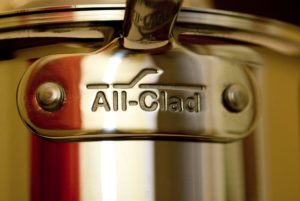
Docket number: MDL 2988; 21-mc-491-NR (W.D. Pa.)
Hamilton Lincoln Law Institute represents an objector challenging the fairness of a settlement that pays class counsel over 80% of the settlement fund, with only a few hundred thousand guaranteed for class members.
The settlement arises from a consumer class action alleging All-Clad engaged in deceptive labeling and marketing by advertising certain of their products, which contained aluminum layers, as “dishwasher-safe” even though the aluminum rusted and corroded when regularly used in a dishwasher. In particular, certain pans thin stainless steel layers became sharp and exposed as the aluminum sandwiched between them eroded. Plaintiffs argued these “sharp edges” presented a safety hazard rendering their pans useless and therefore worthless.
The parties reached a settlement to end the class litigation through a $6 million “made-available” fund, with a multi-tiered class payout. Some class members (those whose cookware has not experienced “sharp edges” and those who discarded their cookware) are eligible to claim only a coupon for 35% off a future purchase on All-Clad’s website up to $750. To make a claim, these class members must submit a timely valid claim form accompanied by documentary proof of purchase. The remaining class members are eligible to claim either (a) $75 and an equivalent replacement item, (b) one of two different multi-piece sets of cookware, or (c) a coupon for 50% off a future purchase on All-Clad’s website up to $1200. To make a claim, these class members must also submit a timely valid claim form. Then, they must return their damaged cookware within thirty days of a date arranged by All-Clad. And finally All-Clad must be satisfied that the cookware is exhibiting the “sharp edges” defect. Class members who submit no claim will receive nothing and, by operation of the settlement’s release, will be stripped of any claims against All-Clad relating the “sharp edges” issue or “dishwasher safe” representations, aside from personal injury claims and property damage beyond damage to the cookware.
Objecting on behalf of class member, and HLLI attorney, John Andren, HLLI argued that the settlement unfairly makes class counsel its foremost beneficiaries. The settlements unfairness is evidenced by the fact (1) class counsel negotiated a disproportionate share of the settlement of their fee; (2) class counsel negotiated red-carpet treatment of its unfair fee request through a clear-sailing clause; and (3) class counsel negotiated a segregated fund that insulates their fee from scrutiny by class members and the Court. HLLI also argued in the alternative that even if the Court does choose to approve the settlement, it should still defer awarding an fees to class counsel until after the claims process has borne out how much relief the class will actually receive. Any fee award should then be based on that realized amount on not on the fictional $6 million number included as window dressing in the parties submissions for settlement approval.
Class counsels motion for final settlement approval is due January 2, 2023. The Court held a fairness hearing on January 26, 2023.
On February 17, 2023, the district court issued an order deferring award of attorneys’ fees until the actual claims rate under the settlement could be established. This alternative remedy was suggested by Objector Andren.
On February 26, 2024, the settling parties notified the court that they had completed the claims process and wanted release of the remaining funds for class counsel’s fee award. Except the settling parties provided no information about the success of the claims process. The Western District of Pennsylvania approved the seemingly routine motion as the settling parties had sufficiently hidden the ball. But HLLI moved swiftly seeking reconsideration of the order, which the court quickly granted, and substantively replied to the settling parties’ notice, pointing the court to the parties complete failure to advise it of the results of the claims process.
On March 12, 2024, the settling parties sought to provide certain information they claimed to relate to the settlement process in aid of their request for fees, but sought to file the material under seal. HLLI quickly moved to oppose the motion on the grounds that at minimum, Third Circuit law required them to provide more specificity as to the information they sought to file under seal. On June 10, 2024, the Court denied HLLI’s motion to reconsider.
Case Documents
| Description | |
| Jun 10, 2024 | ORDER Denying Reconsideration |
| Mar 29, 2024 | REPLY in Support of Motion for Reconsideration |
| Mar 13, 2024 | RESPONSE to Joint Motion to Seal |
| Feb 28, 2024 | RESPONSE to Joint Notice of Completion of Claims Process |
| Feb 27, 2024 | MOTION for Reconsideration of Order Releasing of Remaining Funds |
| Feb 17, 2023 | ORDER Regarding Attorneys’ Fees |
| Dec 08, 2022 | OBJECTION of John Michael Andren |
